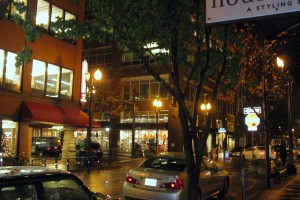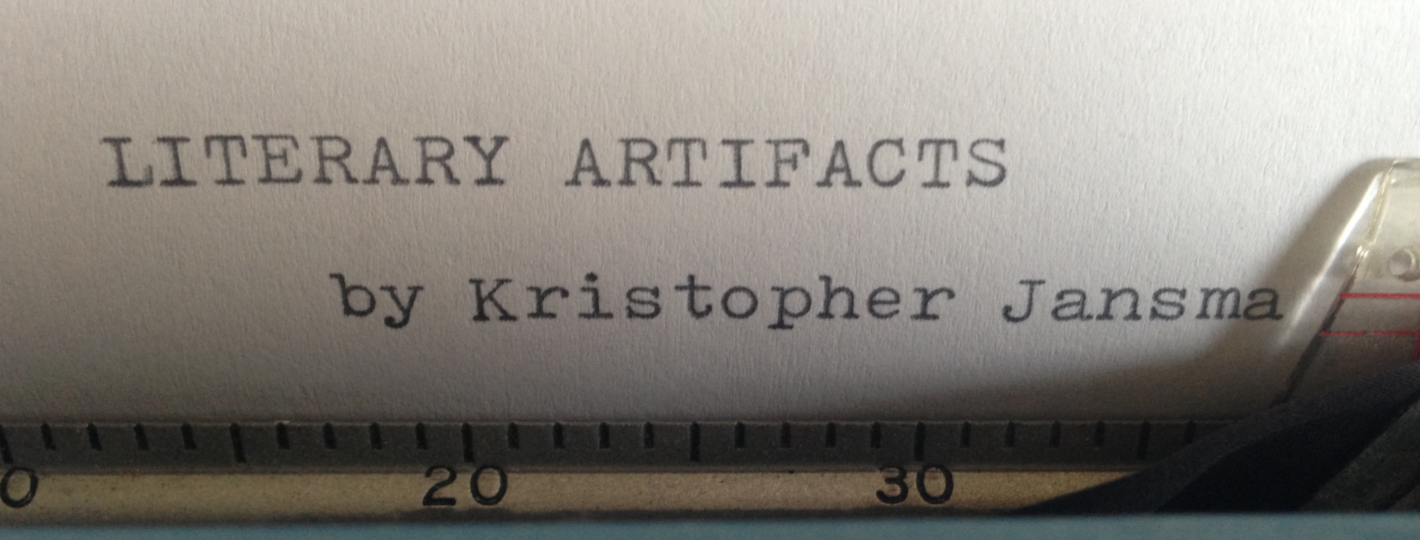Books & Culture
LITERARY ARTIFACTS: “THIS IS A FREE BOOK”

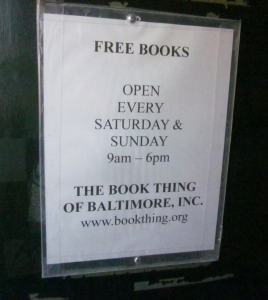
Each month in the Literary Artifacts space, writer Kristopher Jansma writes about his encounters with rare books, writerly memorabilia, and other treasures in New York City and around the world, hoping to discover how the internet age is changing the face of literature as we know it.
What exactly is a book worth?
The Oprah-stamped and Pulitzer-winning novel Middlesex by Jeffrey Eugenides will cost you around $15 these days at most brick and mortar booksellers. On Amazon you can order it for $10.20 and pay for shipping, or you can download instantly it to your Kindle for $9.99. There are 37 different used copies listed on Amazon for only $4, shipped. At The Strand in Manhattan, the same will run you $7.50. You can borrow it, of course, from the New York Public Library — but you’ll have to wait. Currently, all 34 copies owned by the New York Public Library are out, as are the 5 eBook copies recently made available for rental.
Only every reader knows that a book’s worth is not the same as its cost. We’ve all paid too much for an unreadable dud, just as we’ve all grabbed lifelong favorites for just a buck or two.
But what if you could your own pristine copy of Middlesex for absolutely nothing?
To find out, I journeyed to Baltimore, to a little place called The Book Thing where Eugenides’s novel and thousands of others are always absolutely, 100% free.
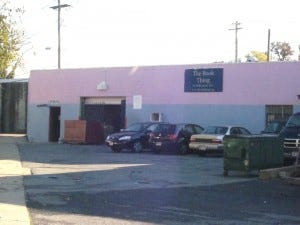
The Book Thing is a simple, single-story building identified only by a small purple sign and a dumpster out front marked “Book Drop” and hidden away on a diagonal street beside a Prosthetics & Orthotics Store. All week long, the Book Thing’s doors are locked but at 9 AM on weekend mornings you will find a line of booklovers outside, waiting to rush inside, grab a cardboard box from a corner pile, and begin rummaging through 200,000 books — without a price tag in sight.
You can take as many books as you can carry, and yes, some people bring trucks. “Forget comparisons to other places in Baltimore,” the Not For Tourists Guide opines, “this is absolutely one of the greatest places on the face of the earth.”
The Book Thing is a non-profit charity run by Brooklyn-native Russell Wattenberg, who was driving to Florida in the mid-90s when he made an unscheduled stop in Baltimore and never left. While bartending, he heard local teachers complaining they needed books for their students, so Russell began picking them up cheap ones at yard sales. Before long, The Book Thing was born.
Their website states that their mission is “to put unwanted books into the hands of people who want them.” Each week, Russell and a handful of volunteers sort through heaps of donated books. A tiny fraction of these are sold privately to help pay overhead costs, and the rest are sorted, shelved, and given away to all takers. To dissuade re-sellers from profiting off of the charity, each book gets stamped “THIS IS A FREE BOOK”. 10,000 are given away each week to readers, teachers, and students from all corners of Baltimore and beyond.
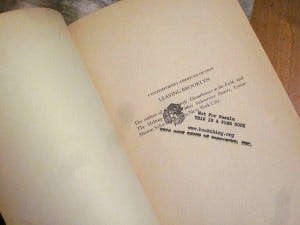
The books are organized into sections: “Gardening”, “Children’s”, “Religion”, etc., but they are in no way cataloged or alphabetized. So it becomes a treasure hunt.
During my visit, I walked around with my head tilted at 90 degrees. Shelf after shelf is filled with books — often times unfamiliar, many remaindered or long been out-of-print. I began to wonder about the people who once owned these books: The Boy Who Invented the Bubble Gun by Paul Gallico, Wives and Mistresses by Suzanne Morris, or Doctor Cobb’s Game by RV Cassil… Are they fun? Terrible? Illuminating? Trashy? And why are there so many copies of Primary Colors?
Bought once, passed over, forgotten in basements, and finally simply given away. I began to suspect that I’d wandered into a library out of a Borges story, full of made-up names. Many appeared hopelessly irrelevant and out-of-date. Kafka could hardly have imagined a better illustration of how little books seem to be worth to so many people these days.
But then, out of the corner of my eye, I spotted Middlesex. I already had a copy at home but… well… it was free. I felt a little guilty, almost as if I was shoplifting, except that all around me there were others mining for their own hidden gems. Suddenly I saw that the brilliance of The Book Thing: by removing all cost, each book is given a new chance at appreciation.
Because nothing that’s free will remain forever. Eventually they will all be taken. Public school teachers come looking for books for their students or school libraries. Hopkins students dump off the books they picked up to write their dissertations, and a few weeks later their classmates come looking for research ideas. Charities from hundreds of miles away send representatives to get boxes of books to mail off to schools in Africa, or libraries in New Orleans.
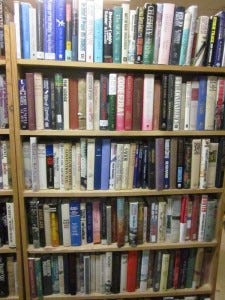
Soon The Book Thing seems instead like a Pynchon-concoction — a vast network of arcane knowledge spread around the globe by unseen hands.
As you might expect, all this can get somewhat problematic for booklovers who live within walking distance. A friend of mine, writer Ariel S. Winter, makes a point of going “every week on Saturday and Sunday… first pick Saturday morning is always the best.” Because it is first-come, first-serve, there is sometimes a minor frenzy when a new cart of books comes out to be shelved, which Winter likens to birds rushing for thrown bread crumbs. The volunteers talk of fights that have broken out over books, though Winter says he’s never seen one go down personally. He prefers to take a more laid-back approach to his treasure-hunting. “Beggars can be choosers at The Book Thing. You want only hardcovers? Only softcovers? Only books in like new condition? Particular editions? They’ll all come through eventually.”
The Book Thing is perfect for those with eclectic literary tastes. Winter himself has written a children’s book about a school for twins, a crime novel called The Twenty-Year Death, literary novels, and he blogs about children’s books written by famous literary authors. He’s stumbled across some real finds at The Book Thing over the years. “I got Dr. Seuss Goes to War and S. J. Perelman’s Go West with Al Hirschfeld illustrations. I’ve subsequently given the Perelman back because I knew I’d never read it, and I subsequently found The Most of S. J. Perelman and have that on my shelf.”
In order to avoid total overflow, Winter avoids picking up books if he already owns at least one other book by that author which he hasn’t read yet, and tries to avoid getting books for himself at all, as he already has so many he wants to read. Instead he mines the children’s bins for Golden Books for his young daughter, though he admits that these have still nearly overrun his breakfast nook. Still, it’s worth tripping over a pile now and then, he says. “Even before having a daughter, years before in fact, I had always thought of my library in the terms, I want to share these books with my children. I want to be able to say, go into the library, any book you pick off the shelf will be excellent. This is what I can give to you.”
Winter has volunteered there himself and says that he’s easily given back hundreds of books over the years. But he does note a hidden drawback to frequent visitations, “When you’re spoiled by The Book Thing, it becomes very difficult to buy books. I’ll even look at things on $1 shelves, and feel like that’s more than I want to spend, just because I’m used to free.”
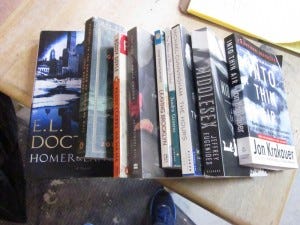
And, perhaps perversely, this is why I felt a bit uncomfortable, as I walked the aisles of The Book Thing with my free copy of Middlesex safely under one arm. More than shoplifting, the experience reminded me perversely of the early days of Napster, when suddenly all the music in the world became magically free overnight. While in high school I gladly shelled out my hard-earned minimum wages for new CDs, living through a Golden Age of (illegally) free media changed my whole idea of the value of music. I still find myself struggling to pay even a single dollar to download a song that I know I will listen to hundreds of times.
This is, of course, one fear of many authors and publishers today — that the emergence of cheap eBooks will cause readers to devalue books. Friends of mine have already grumbled to me that $9.99 seems too much to pay for an eBook, what with all the money that the publishers must be saving on paper, shipping, and overhead. Many will only download the free books that Amazon and Apple offer. They seem dismissive of the idea that the authors, editors, designers, copyeditors, and publicists do still deserve to be paid for all their hard work.
Never mind that these people do much more than design pretty jackets and check for spelling errors — some feel only the genius author deserves a cut, and that with the rise of self-published eBooks, the publishing middlemen will be eradicated. But this is like thinking that the rise of YouTube videos will topple Hollywood, when, if anything, a legion of Web Directors has only broadened what’s possible and become an enriching new influence on the mainstream. If Hollywood had a bad summer at the Box Office, I think we can all agree that was because Green Lantern sucked, not that “David After Dentist” was so good on YouTube that we all stayed home.
Because $14.99 is too much to pay for bad special effects and a stepped-on script, just like it’s also too much to pay for the Annotated Guide to The Kardashian Wedding, forgotten before the divorce is even finalized. But for a new work by an ambitious artist or a dedicated journalist? A few hundred pages that will entertain, provoke thought, and open minds? Which can be re-read yearly and passed on to our children? That’s a steal at ten times the price.
By giving everything away for free, The Book Thing ironically reminds me of the real value of a book. In a city with under-funded schools and libraries (and whose aren’t?), they stock their shelves with books that might have otherwise gone to a landfill. Instead they’ll all reach readers somewhere. What seems worthless to me may in fact be worth everything to the next guy through the door. That’s the whole thing exactly.
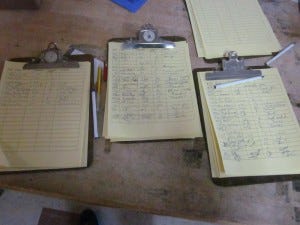
On the way out, all The Book Thing asked was that I sign my name and record how many books I was taking. I picked up nine in just a half hour — all in terrific condition. New, they would have cost about $80. I’ve decided I’ll give Middlesex to someone this holiday season, along with The Hours, God of Small Things, and Midnight in the Garden of Good and Evil. I’m taking Into Thin Air and The House on Mango Street and Homer and Langley into my own classrooms.
And I’ll read Paddy Clarke Ha-Ha and Leaving Brooklyn soon. Really soon.
Just as soon as I get through a few others off my pile. Probably.
If not, I can always bring them back to Baltimore on my next visit. I’m already making a mental list of old books that I wouldn’t mind donating. Just because they didn’t grab me doesn’t mean someone else won’t want to grab them. They’re worth at least that much. To someone else they’ll be worth a lot more.
***
— Kristopher Jansma is a writer and teacher living in Manhattan. His debut novel, The Unchangeable Spots of Leopards will be published by Viking Press in 2013. He has studied The Writing Seminars at Johns Hopkins University and has an MFA in Fiction from Columbia University. He is a full-time Lecturer at Manhattanville College and also teaches at SUNY Purchase. Recently, his short story “A Summer Wedding” won 2nd prize in The Blue Mesa Review’s 2011 Fiction Contest, judged by writer Lori Ostlund. His essays and fiction can also be found on The Millions, ASweetLife.org, The 322 Review, Opium Magazine, The Columbia Spectator, and The (Somewhat) Complete Works of Kristopher Jansma. You can also find him on Facebook.





